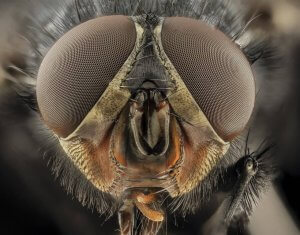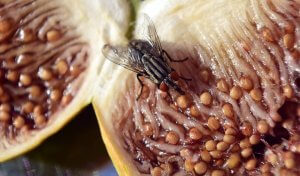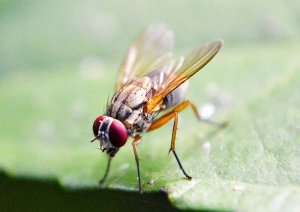The following blog explores the two most prevalent fly species found throughout Pittsburgh and Western PA and provides 12 key tips every “Pittsburgher” should consider to protect their homes from these disease-spreading pests! Explore these tips and be sure to contact our team for any pest-related issues — (412) 252-5200!
Flies Are No Friend To Humans
Flies have few if any friends or admirers among humans, and yet they have been circulating the earth for millions of years in search of whatever food mankind leaves behind. Emerging from naturally wet environments some 220 million years ago, their evolution demanded adaptation to any surface enriched with necessary nutrients found in almost any earthly environment.
According to a research paper published in Proceedings of the National Academy of Sciences of the USA (PNAS), there are 152,000 named species of flies representing around 10 percent of all species on Earth, and the house fly (Musca domestica), comprises some 12 percent of known insect diversity, exceeded only by beetles (350,000 species).
Our pest-control and pest-management experts are well aware that the house fly is the most common species found in private Pittsburgh residences, and its spread across the globe is due in large part to its commensal nature; that is, it uses food supplied by external hosts (humans) to survive, but always exists along a periphery of separation from the host.

While it is believed that house flies originated on the steppes of Central Asia, they can be found in all inhabited continents of the world, all climates from tropical to temperate and all populated environments.
The Most Common Fly Species In Pittsburgh
The two most common species of flies that our pest control and pest management specialists are called upon to eradicate from Pittsburgh homes are the house fly and the fruit fly. Both thrive in heavily populated metropolitan areas such as: Miami, Pittsburgh, Cleveland, New York and other large urban centers.
House flies pose significant health risks to humans, as studies indicate that they are linked to the transmission of more than 65 diseases, the pathogens of which they transmit via touch or from bodily fluids such as: saliva, feces, vomit, and urine. The transfer process only requires a few seconds.
Contamination occurs as these insects move between clean and tainted food sources, transporting both the filth on their bodies and internal microorganisms. In a disgusting aside, houseflies are known to regurgitate digestive juices and defecate while feeding.

Some of the most prevalent maladies house flies carry include: food poisoning; dysentery; fever; cholera; salmonella; tapeworm; roundworm and diarrhea. The diseases spread by flies sometimes kill more people than wars. Believe it or not, during the Spanish-American War of 1899, some 5,000 soldiers died from typhoid, a disease transmitted by flies. Consider that statistic against the fact that 4,000 soldiers were actually killed in combat.
House flies reproduce quickly; the female laying about 100 eggs at a time, which in the proper climactic conditions can hatch within two hours! They are usually gray in color with two distinct stripes on their face, large red eyes, and spongy mouthparts.
Follow these 12 tips to pest proof your home this summer!

Infestations aren’t likely to sort themselves out without the aid of the pest-control and pest-management experts because these hardy insects are highly adaptable, breed in rotting organic matter and complete their life cycle indoors. On average, an adult housefly will live for around 30 days. They go through a complete four-stage cycle that consists of egg, larva, pupa and adult stages.
Fruit flies emerge from the up to 500 eggs adults lay. They are known to thrive in any moist, fermented substance, which can be ripened fruits or vegetables, as well as drains, garbage disposals, empty bottles and cans, trash bags, or cleaning rags and mops. Fruit flies are tiny and beige with black rings, eyes that are red or dark, and they are about an 1/8 inch in length. Fruit flies also carry germs and bacteria and contribute to many diarrhea-causing illnesses. They gain ingress into homes through cracks and crevices, but can also be brought in on produce from a garden or grocery store.

Fruit flies use the same or similar genes to develop into adults, and share nearly 60% of human genes. This is the reason, in addition to a very short life span, why fruit flies are often studied by thousands of scientists around the world and are the prefect subjects for genetic experiments.
Both species can be very difficult (if not impossible) to eliminate with DIY methods, and usually pest-control and pest-management services are necessary to properly eradicate them forever from the premises. The first thing a technician will do is locate the breeding site and clean it up.
Relevant Studies and Statistics
A recent Texas study concluded that breeding site suitability for flies (in descending order) was horse manure, human excrement, cow manure, fermenting vegetable matter, and kitchen waste.
However, another study found that structures containing swine, horse, sheep, cattle, and poultry varied in fly populations, with swine facilities containing the most and poultry the least. Fruit and vegetable cull piles, partially incinerated garbage, and incompletely composted manure are also favored breeding locations.
12 Tips To Keep Flies Away From The Home
In most instances for homeowners throughout Greater Pittsburgh, professional intervention from the technicians at Pestco will be necessary to eradicate a fly infestation in a private home or residence, but some preventive cultural control measures that alter the natural setting can be adopted.
They require altering the home environment to prevent house flies from developing. The following tips will hopefully be helpful in eliminating flies naturally from homes and residences without pesticides, but the best repellant of all is to not attract them in the first place.
1. Hang Bags Of Water From Porches
This only works on a limited basis and if the problem is limited to a few flies. The water is said to reflect light and disturb the insect’s compound eye.
2. Use Citronella Candles When You Can
Citronella is an effective fly repellent, but its range is only the small area surrounding the candle. The cost of the many candles that would be needed to clear a larger expanse makes it a questionable solution to a problem that could be better addressed by a professional pest-control and pest-management company.
3. Strategically Use Fly Traps To Repel Flies
These devices do attract flies and work best when placed are far away as possible from where the insects are not wanted. Adding a little sugar water mix acts as a magnet to live flies that become trapped and die. This represents a fusion with the balance of nature, as live insects continue to become attracted to the dead flies.
4. Install Yellow Light Bulbs To Keep Flies Away
According to the most current research, the color yellow, repels flies. However, a home would need to be completely bathed in yellow bulbs in order to achieve the desired result. Once again, not such a viable solution.
5. Clean Garbage Cans Thoroughly and Frequently
Garbage is like perfume to flies, and there is nothing on earth that is more attractive to them. It is where they lay their eggs, which hatch into disgusting maggots, the sight of which is enough for anyone to lose a last meal. Even outside garbage cans that may contain even a little bit of decaying residue will be enough to attract flies.
Empty and scrub trash cans inside and out to remove any old food particles. Use trash can liners to help keep the interior of the cans clean. Be vigilant and always make sure that garbage cans are clean and be sure all trash container lids are always kept securely closed.
6. Clean Up Pet Feces/Waste In The Backyard
Flies love feces almost as much as they love garbage. Cleaning up after animals will help to control fly populations in residential backyards.
7. Use Blue Light Bulbs To Relocate Flies
Flies love the color blue as much as they hate yellow. This has been ascertained scientifically via a recent study conducted at the University of Florida for the Department of Defense. To work effectively, hang the blue bulbs as far away from wherever the flies are not wanted.
8. Try Cayenne Pepper And Water Spray
One common treatment calls for cayenne pepper steeped in water as a spray application. Spritz in doorways and around window sills and the sharp odor will keep the flies away. Pepper spray is non-toxic, but the smell may be unpleasant to some people.
9. Use Common Garden Plants To Repel Flies
Planting lavender, mint and bay leaf in window boxes can discourage flies from entering windows. These herbs, as well as flowers, such as marigolds and nasturtium, can also work well in pots placed in the kitchen, garden and other areas around the home.
10. Check And Repair Screens And Seal Around Windows
Flies do not need very much space to find their way into the average Pittsburgh residence. Homeowners should also check for other places where the flies may invade. This can involve either adding or replacing weather stripping around doors and sealing gaps in corners where exterior walls meet.
11. Strategize The Storage Of Your Food
House and fruit flies are one of many pantry pests you need to protect against. Use airtight containers with tight-fitting lids to store cereal, grains and sugar. Store produce and condiments in the refrigerator and never leave open drink containers or wine glasses out. Rinse them in warm water to remove any sweet residue that might attract flies.
12. Tidy Up The Landscape Of Your Yard
Flies love to hang out among dead leaves and yard waste. Manure or compost piles should always be at least 20-feet away from the home to discourage ingress.
Pittsburgh Residential Fly Control And Management
As of 2020, there are 7 ACE-certified technicians throughout Western PA, and two of those are long-time members of our Pestco Professional Services family. This fact, combined with our Quality Pro-certification and well over 70+ years of continuous operation, make us one the most qualified pest control and pest management companies in all of Western Pennsylvania for home and business owners.

Our experts at Pestco Professional Services are highly experienced and have been on the pest-control and pest-management landscape for more than seventy years.
For the most part, our products and services were focused until recently on industrial and commercial enterprises, but our new home service division, headed by Bob Wiemer, has become very successful, and we provide the homeowner with superior professional advice and strategies based on prevention, understanding fly behavior and the ability to identify signs of an infestation.
Our pro-active pest exclusion services are focused on the selection of appropriate products to implement the process. These will vary in how well they can withstand pest invaders, and one critical consideration is always the realization that there are no one size-fits-all solutions.
In Conclusion
Call our teams today and let us help you with our tried and true, state-of-the-art pest-control and pest-management solutions — (412) 252-5200!
Final thought about flies: Birds are the eyes of heaven, and flies are the spies of hell.~The Writings of Suzy Kassem, Rise Up and Salute the Sun
What Steps Can I Take To Keep Flies Away From My Home?
1) Hang bags of water from porches
2) Use Citronella candles when you can
3) Strategically use fly traps to repel flies
4) Install yellow light bulbs to keep flies away
5) Clean garbage cans thoroughly and frequently
6) Clean pet feces pet and waste in your backyard
7) Use blue light bulbs to relocate flies
8) Try cayenne pepper and water spray
9) Use common garden plants to repel flies
10) Check and repair screens and seal around windows
11) Strategize the storage of your food
12) Tidy up the landscape of your yard
Photo Credits: Pixabay
 Over 300 Reviews
Over 300 Reviews 